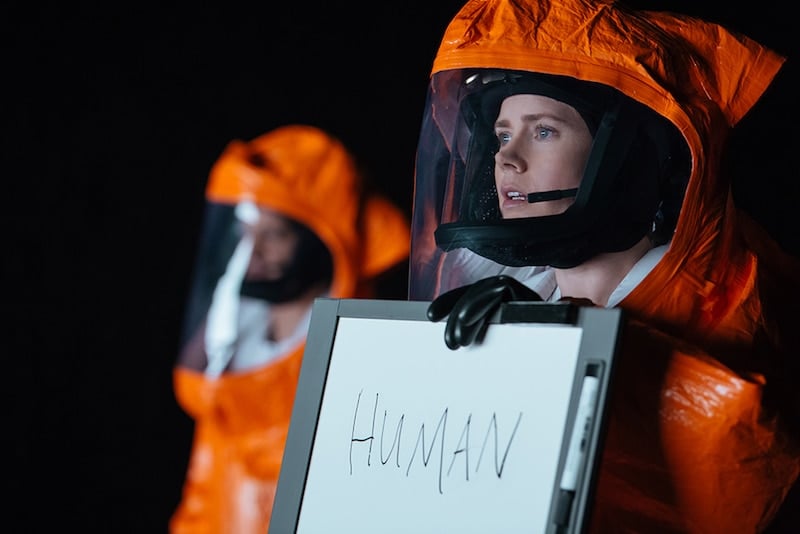
The mark of a good alien film starts in the construction of the scene when you meet them. The moment in Arrival is so good that it ends with a main character vomiting.
World-renowned linguist Louise Banks (Amy Adams) is plucked by the U.S. Army to head a group of experts, including mathematician Ian Donnelly (Jeremy Renner) to solve a mystery as to why several alien spacecraft have suddenly appeared at the same time, hovering over different points of the globe.
Louise and Ian were brought together by US Army Colonel Weber (Forest Whitaker) who is under immense pressure to discover the aliens’ motive. But that is getting far ahead of what comes first.
We meet Louise in a series of vignettes that chronicle her daughter Hannah’s brief and tragic life. Seeking out a connection with the aliens helps Louise cope with emotional and psychological fallout that she’s pushed down.
Her compassion and understanding of humans’ tendencies cements Adams as the protagonist, flanked by male support.
This is just Team USA as every nation has their group of specialists trying to make contact and communicate with their corresponding ship.
One of the problems though is that the aliens have only so much patience in corresponding with a species that doesn’t understand them, giving them a few minutes at a time at a common meeting place in their ships before floating away.
As a coalition, the world is racing to solve the mystery and hopefully stave off the threat of planetary destruction.
Who are the aliens? Where did they come from? Are they hostile? What do they want? What is their purpose? You know, it’s alien invasion 101.
But while mind-numbingly bad films like Independence Day will have you believe that you can plug your Macbook Pro into an alien spaceship and upload a computer virus to take a species down, much of the film’s run time is devoted to bridging the massive communication gap, the methodical process to decontaminate, working through sleep deprivation and seeing the awesome glory of a beautiful minimalist alien ship and the mysterious dwellers.
It’s only natural to be curious, to want to know the most minute details of the aliens, take in the deliciously designed surroundings and yet in Arrival, we are distracted just enough to unknowingly be reacquainted with our own species, our foundation, our history, our flaws as well as our potential.
I liken Arrival to the 1997 classic Contact, starring Jodie Foster and Matthew McConaughey. In that film, the central struggle was faith vs. science as experts of all disciplines try to decipher a complex message from an alien race.

In Arrival, the theme is less existential and more goal-driven. It’s certainly more eerie and ominous but whenever the wonderful disciplines of science and what makes us an intelligent race are on display in a creative way, viewers never lose.
Like how we communicate when there is no common ground and the science of syntax and interpretation. How does the instinct to learn clash with our nature to self-preserve? How many past civilizations underwent a similar conflict due to the inability to speak to one another?
Arrival is based on a novella by Ted Chiang, titled Story of Your Life and adapted by present day horror screenwriter Eric Heisserer.
It’s unlike most science-fiction or genre film, which is usually filmed trying to frame each shot with gaping space to leave room for hours of post-production work to fill that space in with business, action or a dystopian landscape.
Arrival has a more intimate feel to it, a very familiar timeline of a not-so-distant future as the camera work of Bradford Young prefers to hold in frame the incredible stress put on Louise’s face, her jittery hands, or the silhouette shots of Renner’s Donnelly, more so than what is no doubt countless hours of subtle and seamless special effects work.
Director Denis Villeneuve recently helmed last year’s border patrol thriller, Sicario, and Amy Adams is terrific at the driver’s wheel, transferring Louise’s passion on to the viewer.
Each visit with the heptapods (named after the number of appendages they have) is never quite enough and we are left unfulfilled just as Louise is.
As the stress builds, Adams delivers a wreckage of a hero, juggling the anxiety of this massive responsibility with the permanent scarring of losing a child. It’s a star performance as one would hope from one of today’s brightest talents.
There are some minor concessions, like seeing China and Russia be the adversaries — again — impatient and impulsive, but as with Sicario, and another one of Villeneuve’s women-centric films, Incendies, the stronger story is the one that lies beneath the surface, making him a natural match to helm this story.
There might be no better timing for a smart science-fiction film like Arrival to hit the screen. A brief trip away from our current world can be a soothing salve from all of the mind-deadening news.
Arrival will fire up your brain cells in the right way, but still reimagine modern humanity’s complexities in a more digestible way.
It’s the rare kind of sci-fi that moves you. That’s what good science-fiction is always capable of, and specifically what smart science-fiction looks like when done right.
Arrival
Starring Amy Adams, Forest Whitaker, Jeremy Renner, Tzi Ma and Michael Stuhlbarg
Directed by Denis Villeneuve
Run time: 116 Minutes
Rated PG